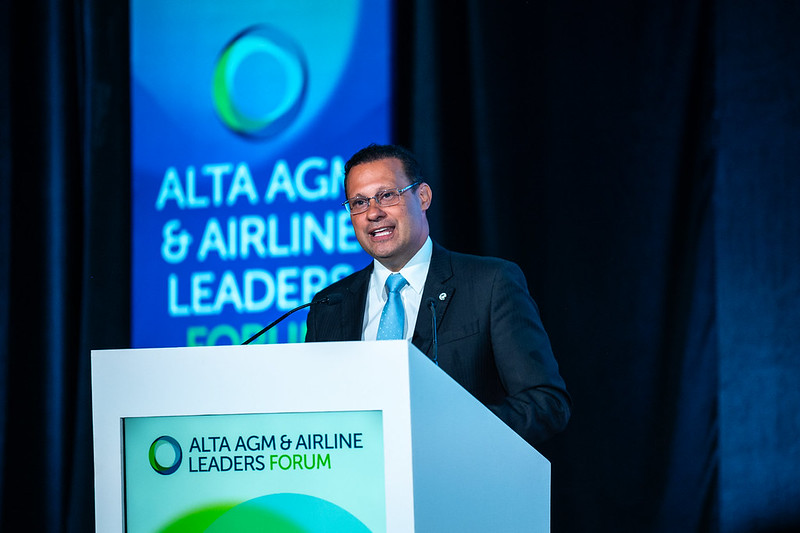Executives call for reinforcing connectivity and integration in the region
According to industry executives, the region still has a lot of space to grow and connect
October 24, 2023

Cancun, October 24th - Latin America and the Caribbean has mobilized about 300 million people by 2023 when in 1970 there were only 18 million, a growth over time that is reflected by a greater number of connections but still not enough, stressed the President of ALTA's Executive Committee, Adrián Neuhauser, at the opening of the 19th ALTA AGM & Airline Leaders Forum 2023.
Issues such as the need for greater integration, infrastructure, exchange rate volatility and lack of policies that encourage the production of sustainable fuels are some of the challenges facing the aviation industry in the region, according to industry representatives present at the ALTA AGM & Airline Leaders Forum 2023 in Cancun, Mexico.
"We consider ALTA AGM & Airline Leaders Forum 2023 to be a great opportunity to bring us all together as an industry and as regulators to discuss and create common spaces to see growth and integration and provide greater connectivity to the Latin American region," Neuhauser highlighted.
The president of ALTA's Executive Committee admits that there is a shortage of land connectivity, rail connectivity and that connectivity is complicated and constrains integration between countries.
"We are a region that has yet to grow. Statistics show that flights per capita in Latin America are still a quarter of what they are in developed countries and that is an opportunity to continue growing," he added.
Meanwhile, José Ricardo Botelho, ALTA's Executive Director & CEO, stated that "although we are almost back to pre-pandemic levels, we must remember that the region continues to face serious infrastructure problems, unnecessary and unrelated ticket costs, currency volatility, rising fuel prices and many other challenges. This is why we want to take this moment to ask that we work together".
According to Botelho, aviation is not only a means of transport; it is a pillar of social inclusion. Through it, a greater number of individuals have access to the safest and most efficient means of transport, which is also shaping up to be the most sustainable in the near future.
"Aviation fosters collective wellbeing, creating opportunities that range from the cab driver waiting at the airport to the local craft, the restaurant chef and the tour guide, among many others," added ALTA's CEO.
Another challenge addressed by Botelho is about sustainable fuel policies, as despite the region's natural wealth and the availability of raw materials, there is a notable lack of initiatives on this matter, as well as a lack of incentives.
"We must be cautious and avoid regulations that impose sustainable aviation fuels (SAF) mandates on us, especially when these are not aligned with CORSIA guidelines. A tangible example is in Brazil, where a bill is being discussed proposing a 10% reduction in carbon emissions by 2037 compared to 2026. If SAFs were relied upon exclusively to achieve this goal, local production would be deficient, generating an additional cost to the industry of over billion," Botelho said.
ALTA's Executive Director stated that carbon offsetting, adjusted to the capacity of each country, emerges as a viable alternative, in addition to public policies that promote the improvement and expansion of aviation infrastructure and economic incentives for large-scale production and consumption of SAF.
From IATA's vision
Willie Walsh, Director General of IATA, who participated in the ALTA AGM & Airline Leaders Forum 2023, provided details of the region. He points out that the region suffers from problems such as taxes of 50%, while in the rest of the world they are at 32%. But there are many challenges, the potential for the market is great, although fuel costs impact the profitability of the business.
Another challenge for the region focuses on achieving zero emissions. "Countries will operate at different paces, the United States and the European Union will have to make faster progress, while the rest will need time to reach the goals. The route will not be the same for all airlines and it is wrong to penalize all of them equally, even if they don't operate at the same pace."
"If they don't all reach the overall goal they will fail in their ambitions. But if we don't have SAF in the region, how can we expect airlines to have sustainability," he adds.
He emphasizes that exponential growth in SAF production is required by 2030. He acknowledges that the region is not even 10% close to achieving SAF production by 2050.
He also stresses that, just as governments subsidize and incentivize fossil fuels, an equal boost should be given to the production of sustainable aviation fuel.
"All the drops of SAF have been acquired by the airlines. We have demonstrated that we want to be sustainable. Exponential growth in SAF production is required by 2030. Airlines will not be able to afford the production."
The Director of IATA insisted that for aviation to reach more people, a framework that incentivizes investment in SAF is essential.
"Investors need to ensure that they will not change the game rules. So, we need a policy framework. We see a great opportunity in the region."
Infrastructure in Mexico
Rogelio Jiménez Pons, Undersecretary of Transport of Mexico, pointed out that they generate better infrastructure conditions such as the building of the new airport in Tulum.
Jimenez Pons mentioned that four or five projects are being prepared for new airport structures with mixed investments in Public-Private Partnership in Mexico.
He considers that it's important the relationship between the government and the private sector must be strengthened with transparency and honesty.
For more pictures:
https://www.flickr.com/photos/196924289@N06/albums/72177720312085451/
For streaming, click here:
https://www.youtube.com/watch?v=o-fVN46tf0k&t=15684s&ab_channel=ALTA


